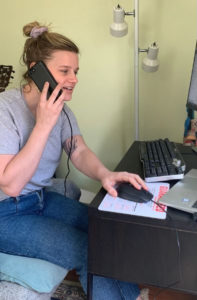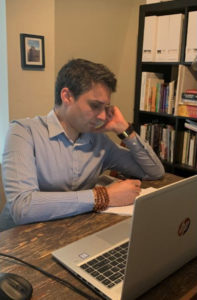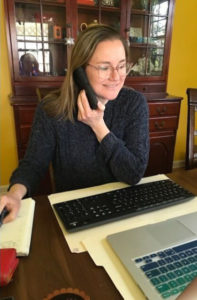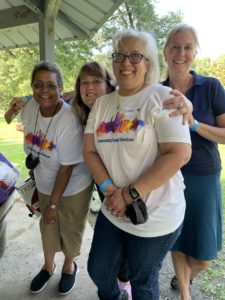Community Legal Services of Philadelphia (CLS) holds a unique place among The Promise’s grantees. That’s because the agency provides free legal assistance to clients referred by all Promise agencies, as well as many others. In fact, CLS served more than 10,000 low-income Philadelphians in the past year alone. Many more were helped through the agency’s high-impact litigation, community education, and policy advocacy to improve the way programs work.
When you talk to Debby Freedman, CLS’s executive director, the sheer enthusiasm and commitment to helping people struggling to get by bursts through. She explains that legal problems can cause people to lose their homes, health, incomes, and even families.

“Our clients are resilient and resourceful,” she said. “But they are navigating government systems that are in the best circumstances bureaucratic and daunting to navigate, and during the pandemic have been very hard to access, particularly for folks who do not have broadband access or may have a language or literacy barrier. With the Social Security and Welfare Department offices closed, legal services and the availability of our team have been a lifeline.”

The legal services CLS provides are about ensuring that families in Philadelphia have access to the most fundamental needs. They come to CLS for help with food. They come because their utilities are about to be shut off. They come when they need healthcare, and they don’t have health insurance
“One of the most important ways that families in need access food is through SNAP (a.k.a. food stamps),” Freedman said. “Usually, people can apply and get help, but frequently people run into problems trying to apply or they may not be getting the right amount, or they may not be able to add a new child to their grant, and that’s when we help people access food stamps.”

It is not just on an individual basis. During the pandemic last year, CLS and pro bono co-counsel Morgan Lewis successfully sued the U.S. Department of Agriculture on behalf of Pennsylvania families, because the government was not providing congressionally mandated extra food stamps to the lowest income families. The result – hundreds of thousands of low-income families received additional food stamps. That’s just one example of how CLS’s work for individuals inter-relates to the organization’s systemic advocacy.
One frustration CLS lawyers and advocates see frequently happens when people unnecessarily spiral down deeper into poverty through an unfortunate chain of events.
“One thing goes wrong, they lose a job,” said Freedman. “They become temporarily disabled and they fall behind on their mortgage and their water bill. If they had a lawyer at the point of falling behind on their mortgage, they could have gotten an agreement to pay it off and not gotten behind on their water bill, but instead it goes down from there.
Freedman said for herself and CLS staff, empathy plays a big role.
“Our staff are dealing all day long with people who are in crisis, who are facing true injustice,” she said. “And to work alongside these clients for justice and what they deserve, can be traumatizing. Our clients are in trauma and our staff experience that trauma along the way as well. So, to do this work, you really have to care, and our staff members very much do.”

The justice gap, meaning unmet legal needs in low-income communities, is enormous. Estimates show about 86% of low-income Americans do not receive the legal help that they need for their civil legal problems.
“There is a tremendous need for legal aid, and we try to bridge that justice gap in a lot of different ways,” Freedman said. “CLS staff are doing community education all the time. We do a lot via Facebook Live. We’re on community meetings with legislators at every level of government to try to get the word out about people’s rights. We have information on our website, which has gotten nearly two million views during the pandemic. And we have a very big social media presence. Partnering with community groups is a critical way for us to reach potential clients, who may not know they have a legal problem or may need just a little information to help themselves.”
One of the areas for legal help that has increased dramatically during the pandemic is unemployment compensation, a priority area under The Promise. CLS has helped clients receive millions of dollars in unemployment. Freedman cited one recent case to underscore the point.
“We have a 17-year-old client who lost her job and needed to file for unemployment, but in order to upload your ID into the unemployment compensation system you have to be 18,” she explained. “This person was out on her own. She was entitled to unemployment compensation, but she couldn’t upload her ID into the software that our state Department of Labor and Industry uses to be able to get help. It took quite a bit of legal advocacy for us to help her get this basic income. A ton of cases under The Promise are like that where there are these hidden barriers and layers of various things you would never think of.”

Ultimately, Freedman said, lifting people out of poverty is going to require education, job creation and finding or creating pathways to employment for people with criminal records, which The Promise’s Jobs and Opportunities challenge grant will soon address.
Solving poverty is a complex, multi-layered issue, but Freedman calls being part of The Promise, and what the program can achieve, exciting.
“I have optimism in the face of knowing how truly hard this effort really is, and how sustained it needs to be. One thing we know about complex, difficult problems is that they do not get solved quickly. We have to have the patience to do what it takes.”


